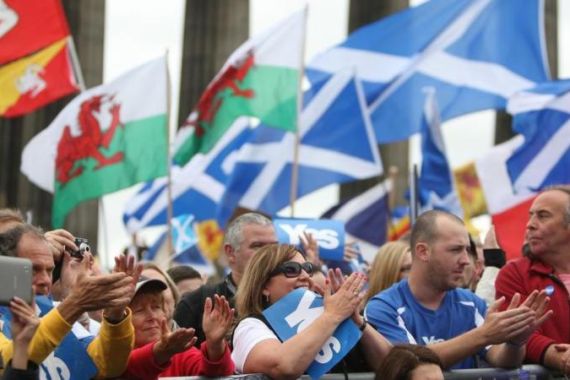Scotland’s ‘No’ campaign is a downer
Critics say ‘Better Together’ campaign’s negativity could help Scotland’s pro-independence side win referendum.

Glasgow, Scotland – If the opinion polls are to believed, Scotland’s pro-independence campaign is still set to lose the referendum scheduled for September 18.
But with just months to go until the historic vote, the pro-union alliance – backed by the might of the British establishment – has hit choppy waters.
Having enjoyed a consistently healthy poll lead over their “Yes Scotland” rivals, “Better Together” – the official campaign charged with saving the 307-year-old union between Scotland and England – has lost ground. One poll last month put support for independence at 48 percent, compared to 52 percent opposed – the highest level of “Yes” support recorded by an independently commissioned opinion poll.
It has proved a challenging time for those tasked with keeping Scotland in the United Kingdom, with Better Together chief Alistair Darling attracting widespread criticism from many on his own side, and the group’s mostly negative campaign style under attack from political commentators. The Sunday Herald, meanwhile, became Scotland’s first national newspaper to publicly back independence on May 4.
All political campaigns operate between positive and negative - but it is true that so far the points at which Better Together have been positive are so episodic and so small scale as compared to the power of the apocalyptic language they have used in their overall campaign.
“Obviously, Yes Scotland is massively mobilised – this is their dream contest,” says Scottish political writer Gerry Hassan, speaking to Al Jazeera. “Better Together didn’t want this contest to be happening in the first place and [former British chancellor] Alistair Darling didn’t want to be leader of it.
“He is only leader of it because there was no one else, and you find that in his body language during media events. He looks irritable…” Hassan says that Better Together have resources and professional staff, but lack a proper campaign and foot soldiers. “All these things have played into where we are now, where the pro-union campaign has made a series of missteps.”
‘Apocalyptic language’
Hassan, author of Caledonian Dreaming: The Quest for a Different Scotland, says such “missteps” include British Chancellor George Osborne’s public refusal to share the pound with an independent Scotland – and the absence of any great positive vision in Better Together’s rhetoric.
“All political campaigns operate between positive and negative, but so far the points at which Better Together have been positive are episodic and small-scale as compared to the power of the apocalyptic language they have used in their overall campaign,” says Hassan.
For some analysts, however, it is not the negative message of Better Together per se that is widely seen as turning many voters off but the very nature of it.
“We know from research that negative campaigning tends to work,” James Mitchell, a professor at University of Edinburgh’s School of Social and Political Science, tells Al Jazeera. But, he adds, of the pro-union camp message: “It’s not just that it’s negative – it’s angry, it’s so over the top it’s not credible. Lack of credibility and tone are their two problems.”
Scare tactics
 |
| The latest polls show 48 percent of voters support independence for Scotland [AP] |
Mitchell cites the most extreme example as remarks made by Scottish pro-unionist and former British defence secretary Lord George Robertson, who told an audience in Washington, DC last month that a vote for Scottish independence would be welcomed by global “forces of darkness” and endanger Western security.
“Frankly, that was the kind of thing you could say 20 or 30 years ago and scare the horses. These days people are less likely to be scared,” explains Mitchell.
Other observers have critiqued the No campaign’s realpolitik strategy. Scottish political blogger Alex Massie tells Al Jazeera that, while Better Together’s message may be robust, the pro-union camp see their objective as defeating pro-independence forces in September’s poll.
There is almost an assumption on their part that 'of course the union is good', but they've got to be prepared to defend and explain why they think that is - and they seem to struggle with that.
“The No campaign say they’re not worried about criticism [of their campaign strategy],” says Massie, who writes a regular blog for The Spectator.
“They don’t see the point of running a cheery populist campaign that loses. They would rather win with a negative campaign than lose with a more positive uplifting message. They have identified the voters they need to speak to, the voters they need to attract – and they don’t really care about what anyone outside the campaign office thinks.”
Referendum reality
With just a few months left until polling day, Mitchell has a few choice words for the Better Together campaign.
“Part of the problem for the No campaign is that they don’t think there should be a referendum in the first place – but they’ve got to get out of that mindset, they’ve got to accept there is a referendum,” says Mitchell.
“They shouldn’t get sucked into changing [Alistair Darling]… because at the end of the day, if you change the key figure without changing the message in some way, you’ll get the same results. There is almost an assumption on their part that ‘of course the union is good’, but they’ve got to be prepared to defend and explain why they think that is – and they seem to struggle with that.”
Follow Alasdair Soussi on Twitter: @AlasdairSoussi